Subscribe to ‘Words Of Hope’
Get our emails direct to your Inbox with updates about all our campaigns, trips and events.
Welcome to First Of The Month — a new big read from Amos Trust. Digital-only, long-form essays from Amos staff, friends and creative collaborators. For our first edition, Amos Director Chris Rose looks at what it means to be hopeful.
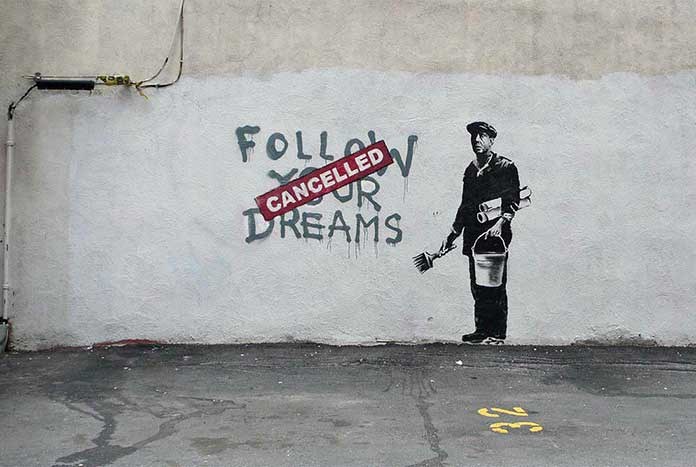
Amos Hope: An introduction
We all know that one person’s hope can be another’s dismay — just ask rival football supporters — but increasingly the word itself can set off alarm bells.
We are all too familiar with ‘toxic hope’ that fails to engage with the reality we live in and is at best a band aid, and then there’s the falsehoods of politicians — “it will be over by Christmas”. Hope is vital, as Dostoyevsky said: “To live without hope is to cease to live.”
A lack of hope has profound effects on our mental well-being. When we feel hopeless and powerless on vital issues such as climate change, the economy or the pandemic, we can become crippled. The lack of hope stops us from acting and we find ourselves once again reaching for a panacea.
The hope we promote at Amos is very different from the long list of things we hope for. This is not to belittle these, at a time when all of us are holding on; these are vital — in fact holding on can for many people be the greatest demonstration of hope.
To hope that sometime soon we will be able to hold those we love, go to school or work, or a café, a pub or to the match, is desperately important, and within these are contained far deeper hopes and fears, that those we love are safe and well, that we will be able to feed our family, pay the bills, have a job to go to, that we will once again have human company.
Each faith-tradition has a particular take on hope. As well as sharing a belief in some sort of after-life, most also stress that one day injustice and suffering will end — unfortunately sometimes only for the elect. For those experiencing injustice and suffering (or campaigning against it), the belief that one day it will end can be a great comfort — even if we may find ourselves echoing the Psalmist’s cry, “How long?”
We are all too familiar with ‘toxic hope’ that fails to engage with the reality we live in and is at best a band aid, and then there’s the falsehoods of politicians — “it will be over by Christmas”.
We are named after the Hebrew prophet Amos’ call “for justice to flow like a river”, this refers to future hope, but also to a commitment to act now. For hope is not prognostication. Hope requires action, however small or limited, a response is essential. For hope and action feed each other and without action, hope all too easily becomes wishful thinking.
Hope is also interwoven in the relationships we enter into, when we join with others in responding to a need or issue, we find unexpected resources of hope as there is something about working together that encourages this. If we can do so in such a way that recognises and addresses power imbalances and privilege, then we develop relationships and friendships that draw us further and further into a shared hope.
It’s Christmas Time: rebuilding hope
Christmas Day, Bethlehem 2020 — it’s hard to imagine anywhere more synonymous with hope. Work has just begun on rebuilding a home that was destroyed in June 2014 following the kidnapping and murder of 3 young Israeli boys hitchhiking on the Hebron Road. The response to the kidnappings led to the assault on Gaza that left so many dead; and for a family, with 8 children under 16, it has meant spending 5 years living in a converted chicken shack that has never been fit for purpose.
We are in al Khader, on the south west edge of Bethlehem district. It is where you leave the Palestine-controlled Area A of Bethlehem and head into Area C (full Israeli control). For those who have visited, it is where the road goes up past the coffee seller and you join Route 60 to Hebron; or for those who have run the marathon, it’s where we turn round and run back to Manger square.
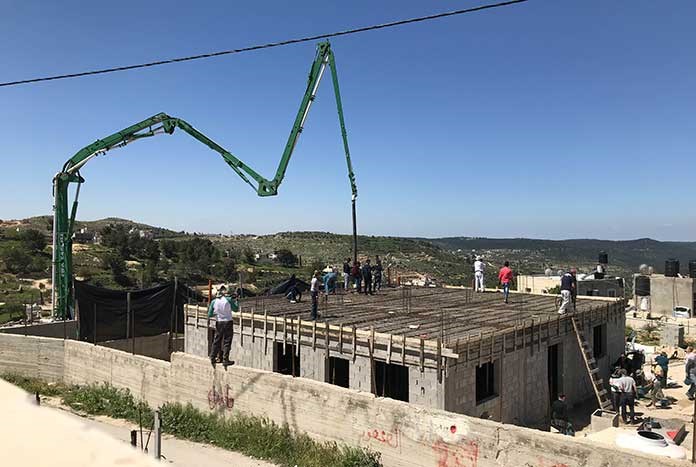
Up On The Roof: Concrete being poured onto the roof of a new home being rebuilt in the West Bank — April 2019
This home was destroyed because it was sited beside route 60 and the Separation Wall that lines it, and is near to an Israeli military base and watchtower. The justification was that it was built without planning permission. While that may sound reasonable, the reality is that if you are a Palestinian applying to build on your own land in Area C (which is the majority of the West Bank), you have a 1% chance of getting planning permission, so you have no choice but to build illegally.
The use of this practice by the Israeli Defence Force has been described as collective punishment, or, as family demolition, and has been condemned by nearly all international bodies.
Last October, we were asked by our local partners if we could help rebuild this home. We realised that Nive Hall (Amos’ Operations Manager), had taken writer and director, Justin Butcher, and a group of performers from the Bet Lahem Festival to the house the day after it was destroyed.
The commitment they made that day, to tell the family’s story, inspired Justin to dream up Just Walk to Jerusalem and features at the start of his book ‘Walking to Jerusalem’. To be able, 6 years later, to help to rebuild this home would bring a great sense of completion. As we started to think about embarking on this project, we had to ask a string of questions. For we know that we are about to join in, invest in and fuel a family’s hopes and dreams, and these may very easily be destroyed all over again.
So we ask:
Then, if we build it — is it likely to be immediately destroyed again by the Israelis? (2020 saw a sharp upturn in the number of house demolitions and displacements). Will the family receive a heavy fine for rebuilding it? Will they serve a demolition order on the house and if so, will we be able to shuffle it into the long grass through a series of legal challenges?
Do the family understand that we will want to tell their story? That we would want to bring a volunteer team to rebuild it with them? That it might be torn down again, and they might get arrested? That our partners and us would refuse to pay any fines the Israelis levy on them as we would not recognise their legality? This is all before we again ask our local partners whether they still think we should do it and if the family are sure they want it rebuilt.
This home was destroyed because it was sited beside route 60 and the Separation Wall that lines it, and is near to an Israeli military base and watchtower. The justification was that it was built without planning permission.
In 2017, three families said “no” to having their homes rebuilt before one family said “yes”. In one sense it gave us comfort, but even then we knew it wasn’t a fair question to ask. If you have had your home destroyed and are bringing up your family in a chicken shed, would you say no?
If you move in knowing that there is a risk that it may be destroyed, would it stop you from going ahead and creating the home you have dreamed of but thought was impossible? Of course not.
This year is the first time we have not taken a group of volunteers over from the UK to help with the build. I say volunteers, in reality this fantastic group of people are far, far more than that. Each time, they have not only gone out and raised the funds needed but also used it to raise awareness of the issues. Each time we have asked them to risk possible arrest and a banning order from Israel and they have got on with it.
This year we would once again be asking them to raise funds and tell the family’s story, but without going to Palestine to join in the building work. We also have to ask ourselves if it is fair to ask them to do this - if we think there is a real danger that it will get destroyed? How would they tell people who have supported them with funds that the house has been demolished? How would we justify wasting £50,000 of charitable funds during a pandemic? What would our other supporters and institutional donors think? Are we being reckless? Is it time to stop this programme... to rethink?
We try to hold these questions against the reasons why we are doing it: to highlight the illegality of home demolitions; to show it’s impact; to build alternative facts on the ground; to demonstrate the solidarity that we are committed to. But these reasons do not balance the scales against all those arguments for saying 'no'. So why have they started to rebuild? Because this programme, more than any other, represents the hope that is so central to us.
Václav Havel, Czech statesman, writer and former dissident, who served as the last President of Czechoslovakia from 1989 while in prison for political sedition, wrote:
Hope, in this deep and powerful sense, is an ability to work for something because it is good, not just because it stands a chance to succeed. The more unpromising the situation in which we demonstrate hope, the deeper that hope is. Hope is the certainty that something makes sense, regardless of how it turns out. Seeds of Hope, Amos Trust 2020
We carried out our first rebuild as an act of protest in 2011, but found it to be far, far more profound than that. As we saw hope rekindled in a family and a wider community, we realised we were walking on hallowed ground, and when the first demolition order was served, our relationships with the family, fellow builders, partners and supporters deepened yet further.
Last year, we received a string of pictures of the building site on Christmas Day and Boxing Day. However, on the 28th December the Israeli Defence Force (IDF) contacted the family telling them that the concrete company had to stop work.
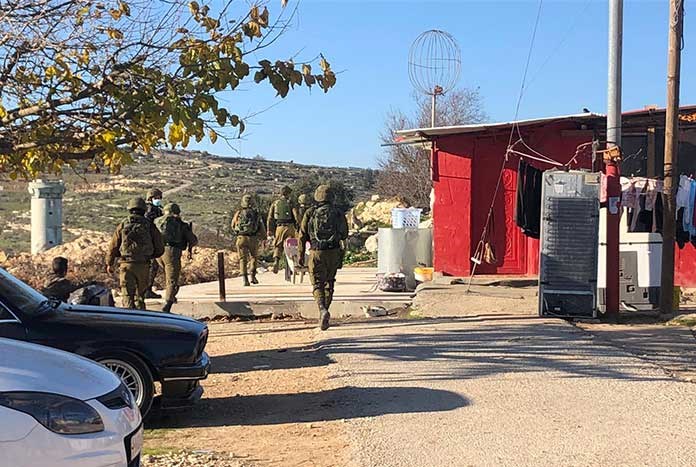
Home visit: The IDF visits the home rebuild.
On the 29th, the IDF arrived and said they would be back in 5 days to destroy the work being carried out. We are, thank God, more emotionally adept now at responding to news such as this than we were in 2011. We may be able to think a bit more clearly, but the underlying fear and the surges of joy and rage are just as real. Once the pictures come in, long phone calls follow. Talking through options, acting as sounding boards, feeding-in ideas and expressing our support, while all the time asking — is there anything we can do?
The most up to date news is that work has been able to continue on the house and we are now looking to raise the final funds needed to complete the build. Are we optimistic that the family will now be able to live there safely? That’s a hard question.
You have to choose to be an optimist when campaigning for Palestinian rights. But that is very different from optimism or being optimistic — both of which imply that it will turn out well. We do not go into a home rebuild believing that it will turn out well, just as we are not optimistic of a political solution for Israel/Palestine. No, we go into a home rebuild in hope and believing that it is the right thing to do.
On Her Terms: Journeying with hope
In 2016 I visited Umthombo in Durban, South Africa. In the 10 years since my first visit, I could see the fruit of the highly effective and exhausting advocacy work which they undertook between 2002 and 2012. It was evident in the way children on the streets were seen and treated; it was there in the development of programmes which had enabled numerous children to leave the streets and to be reintegrated into homes, as a result of which there were far fewer children on the streets.
However, one moment still stands out. As we headed into town from their centre, we passed three girls aged about 14 — trying to be picked up by men in cars as they needed to earn some cash. Mpendulo, Umthombo’s director, explained the difficulties they still faced trying to work with girls who had been on the streets for any length of time (I had heard the same story from many other countries), and I knew that this time we had to act.
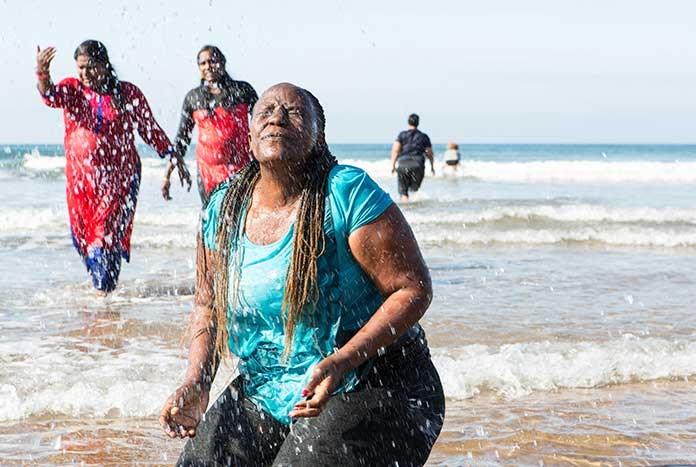
Beach life: Participants on Amos’ On Her Terms conference enjoying some R&R in North Devon — October 2018
It might prove to be desperately difficult to develop programmes for them, but girls like these could not just be discarded and blamed for being on the streets. If we let this happen, what is the value of the hope we talk about, if, in the face of expediency, it offers nothing to stop these girls being written off?
That was 2016. Now five years later, an influx of narcotics (in much the same way as it had in Latin America), has led more young people to come onto the streets, a number Covid has greatly swelled. However, because of the incredibly hard and committed work and learning of Umthombo and our partners in Tanzania, India and Burundi (as well as other like-minded organisations), we are now far more hopeful that girls like these are going to be able to have a future.
It might prove to be desperately difficult to develop programmes for them, but girls like these could not just be discarded and blamed for being on the streets.
There is no instant fix here — no rescue, no re-housing, no restart — it’s a long drawn-out process of healing, of enabling these girls to feel valued, of recognising their learning and worth and of believing that they can make choices about their lives. While there are some great programmes, it is the relationships between the girls and the staff working with them which has been shown, time and time again, to be absolutely crucial. But this work is fragile, it builds slowly with many reversals as well as gains.
It’s the team's (and especially women workers) commitment, hope and belief in these girls, despite all the challenges they face, that leaps out as the transforming part of this work. It’s their commitment to walking with these girls and journeying with them, knowing that by doing so, they are creating the space for change to occur, even if they do not know where that change will go, which has had such an impact.
Each of the projects involved chose to develop work with girls and young women when they knew that there were easier ways forward. The numbers are not huge, the programmes are nowhere near as dramatic as those that hoover up the funding, and the outcomes are far, far harder to measure.
Each of the projects chose to believe that change was possible, to believe in the capacity of these girls and to believe that together we could be the difference we longed to see. They represent so much of the hope we are committed to, as Dorothy Day, the great Christian anarchist said:
People say, what is the sense of our small effort? They cannot see that we must lay one brick at a time, take one step at a time. A pebble cast into a pond causes ripples that spread in all directions. Each one of our thoughts, words and deeds is like that. No one has a right to sit down and feel hopeless. There is too much work to do. Dorothy Day, Christian anarchist
CEPAD: Investing in Hope
In December 2020, Nicaragua experienced two hurricanes in a week. In those areas that had not been damaged by the first hurricane, the ground was so water-logged (despite 11 months of drought), that when the second hurricane hit, rivers flooded, crops and seed were washed away, houses submerged and bridges destroyed.
Many of the villages around Teustepe that we had supported for the last 5 years and who had made so much progress, experienced extensive damage. It’s hard not to feel crushed when this occurs, knowing it is the result of the climate change that we have created; but it is, of course, far harder for them.
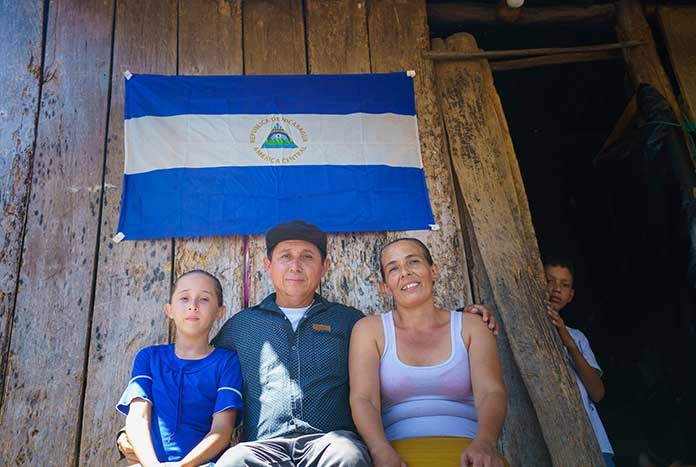
Viva Nicaragua Libra! A Nicaraguan family sit outside their house in Nancital, Teustepe — March 2020
When we started to support CEPAD’s work in these villages we were offered the chance to provide solar panels for some of the communities. At the time, Dámaris who headed up CEPAD, turned it down as she felt that the communities were not the ones asking for them (if they were, CEPAD would look at it differently); and because the villages would not be able to maintain them or pay for the batteries and other parts when they expired.
While her reasoning was sound, I’m not sure I would have made the same choice, and I’m not sure I really understood her decision until after the floods.
The village of Nancital straddles the south side of a mountain. The only road to it has to be repaired each time a 4x4 needs to get to the village. There is no electricity and all water has to be carried to the top of the village in water barrels.
Dotted across the village are obsolete solar panels (donated by another NGO), that stand like beacons of failed progress as the replacement parts and batteries went out of production years ago. There are also the remains of a water-pumping system that another NGO installed to take water up to the top of the village — this was destroyed in another hurricane.
When we visited last March, at the end of the 5-year programme, it was hard not to feel slightly dispirited by the lack of return on the ground. There was nothing very dramatic to see. This forces you to look at where the real investment has been made. The answer is the community itself; the training of its members and the development of community leadership. They have learnt valuable new water-harvesting techniques, simple and effective ways to purify the water, new crops that they can grow, how to increase canopy cover and ways in which small patches of land can feed a family.
None of these are particularly dramatic or eye catching and are part of, an even more important and less visible process of, empowering women in the community and of developing effective local community leadership. For this community now knows how to demand its rights, and the women know that they have the right to speak out.
Dotted across the village are obsolete solar panels (donated by another NGO), that stand like beacons of failed progress as the replacement parts and batteries went out of production years ago.
The day we visited coincided with the arrival of the electricity supply company to start connecting the village to the main grid. After two years of CEPAD’s community building work, the community had come together, identified their goals and had started lobbying local government for what they needed. Three years later electricity is being supplied.
For this to happen, a better road needed to be built and so the council has also started to work on this. The community also pressured the council to send surveyors, who indicated that a well could be dug at the top of the village — when electricity is supplied, water will be able to be pumped up from it.
It had taken 5 years, but this was a community who could now believe that they can affect the future and not just live through a series of fixes. They know that they will have to push to get the funds for the well — but they don’t doubt it will happen. They are in many ways the epitome of the Walter Wink quote: “we should act as if our hope in the future is irresistible”.
So when the hurricanes came and crops were destroyed, the communities CEPAD had worked with were able to quickly identify what they needed and take the practical steps required and know where to turn for assistance.
For the simple reality is, the storms created as a result of climate change will at times wash away whatever we build, however well we do it and however much we invest. More flood prevention responses will be developed, more trees planted, because the impact of the floods is awful. But the real hope is far harder to see, is far more permanent and is far less likely to secure funds than another emergency bail out.
Dámaris was right; long-term changes are only going to happen through the careful investment in the community, in developing local leadership, in empowering women and in training people.
Lessons we’ve learnt about hope
Hoping requires action — hope and action feed each other, for without action, hope is wishful thinking.
Working together — we find new resources of hope when we work alongside others. If we can do so in such a way that recognises and addresses power imbalances and privilege, we develop relationships and friendships that are built around the hope that draws us together.
Choosing to be optimists — we have to force ourselves to be optimists. Maybe for no other reason than as Maggie Smith says, “optimists tend to be those that get things done.” But I understand it in the same way as Leymah Roberta Gbowee, the Liberian peace activist: “I’m a serious optimist. I come from a country where you have little to be hopeful for, and so you have to always be an optimist.”
Choosing to believe — we may or may not take meaning and hope from a particular belief structure or religion, but we have to decide whether we choose to believe. To decide whether we choose to believe in others, to believe that change is possible, to believe that we can make a difference, to believe that another world is possible. As Faithless sung: “I’m not religious, I just like believing.”
Replenishing hope — it is essential that we replenish hope. We talk of developing a spirituality of resistance, or of building spiritual resilience, but what does it mean? It is all those things that give meaning and feed us; beauty, music, art, writing, poetry, design (or just creativity), laughter, friendship, love, tears, great oratory, hospitality, celebration, vision, commitment — and the wonder of the world in which we walk.
I don’t know why Miles Davis’ trumpet can rejuvenate my soul — but he’s coming on my Desert Island, or why Roger Robinson’s book of poetry ‘A Portable Paradise’ was such a vital lockdown companion? Why I love cycling... why?
But I know that without these Seeds of Hope, I cannot inspire hope in anyone else — let alone myself. If we do not spend time with those things that inspire us, we get dry, bitter and want to give up. For we know that hope is a song in a weary voice.
Chris Rose
Director, Amos Trust
— — — — — — — —
More First Of The Month
Other editions of our First Of The Month essays are available to read and download from here.
Words of Hope E-news
Sign up to receive our regular ‘Words of Hope’ emails and keep up to date with all the latest Amos news and information, including details of our trips and events, news from our partners around the world, and all of our campaigns.
Online reflection
Join us for ‘Words of Hope’ online every Tuesday at 5pm — simply click here to join us a few minutes beforehand.
Amos Trust
Room 11
St Margaret’s House
15 Old Ford Road
Bethnal Green
London
E2 9PJ
Telephone:
+44 (0) 203 725 3493
Email:
[email protected]
Registered Charity No.
1164234

This item has been added to your shopping basket. Please click on the Checkout button below where you can choose your quantity.
Continue shopping Checkout Close